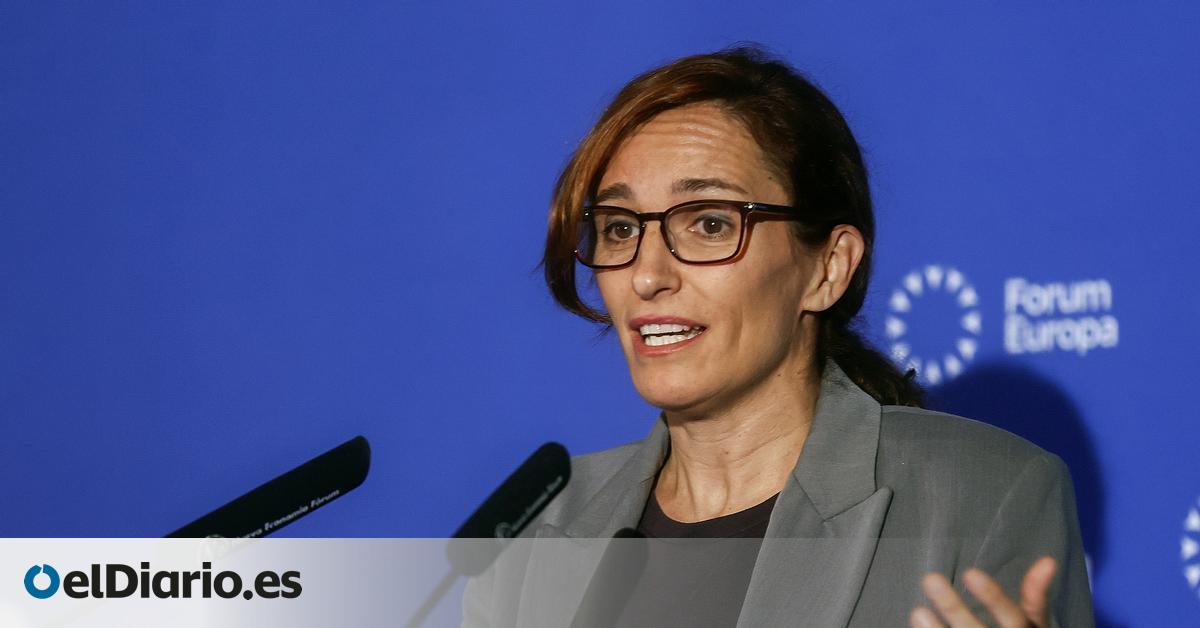
There is a flu plan, but it will not be mandatory. The Ministry of Health reported this Monday that it has approved its program with prevention and control measures for the respiratory virus season, which includes tightening the use of masks based on four risk scenarios. But the measures will only be recommendations because the PP stopped the agreement to implement it, as explained by the minister, Mónica García, before the Interterritorial Council of the National Health System.
The body, which brings together the autonomous communities with the Government, will also evaluate several regulatory projects, such as the medicinal cannabis program that Health is developing, the Vaccination and Immunization Information System and the modification of Royal Decree 579-2017 on medical products. tobacco, focused, among other measures, on regulating the use of vaping devices and heated tobacco. In addition, the minister explained, agreements will be approved that “are key” for the Ministry and the National Health System, such as the registry of doctors who are conscientious objectors in the voluntary interruption of pregnancy, the fourth national plan against antimicrobial resistance, the 2025-2027 Plan and the 2025 Common Vaccination Schedule.
A pioneering plan
It was the first time that the ministry proposed a program to try to control and minimize the effects of respiratory viruses, with measures similar to those used during Covid-19. It was proposed to avoid the “chaos” that was experienced last year in the health system, as García justified at the time. In 2023, given the peak of infections and the lack of consensus with the communities, the Ministry ended up imposing the mask in health centers.
Now it proposed a gradual use plan based on four possible scenarios, but the PP communities rejected it as “immature,” they said, so the ministry has approved it as a mere recommendation. “The autonomous communities of the PP stop the document written by their own technicians to have for the first time a common action plan against the respiratory virus epidemic,” said Javier Padilla, number two at the ministry.
The first step, 0, the risk is “inter-epidemic or basal” and it is recommended to use a mask for all people with symptoms, in addition to self-isolation.
Scenario 1 would be activated when transmission is low or moderate and extends, within the groups where use is recommended, to healthcare personnel, patients and companions in vulnerable areas of healthcare centers (chemotherapy rooms or transplant units). In this situation, symptomatic people are recommended to minimize contacts.
High circulation of respiratory viruses would lead to risk scenario 2, which adds additional measures for people at risk of developing serious complications. It is recommended that all people – workers, patients and companions – wear the mask in waiting rooms or medical emergencies, “assessing its obligation in a general manner or in centers that are determined according to their specific situation and vulnerability.” In this scenario, the use of face masks also extends to all workers in senior centers, but not to residents. Just as in health centers, it will be evaluated whether or not it is mandatory in general or by centers. The possibility of restricting visits to residences is also open, although always assessing “the emotional repercussion” it may have. In this situation, the elderly and chronically ill are recommended to wear a mask in public indoor spaces.
Entering scenario 3 implies that the risk of transmission is “very high” or “pandemic”. For this hypothetical situation, the document says that coordination between communities will be reinforced with extraordinary meetings of the Interterritorial Health Council and contemplates the adoption of “additional and exceptional actions that will be implemented in accordance with specific regulations” without giving more details. The Health plan, in any case, opens the door for each region to implement the additional measures it deems appropriate.
A flower-free cannabis program
The Council will also evaluate the medical cannabis program that the ministry is developing. Health has opted for a basic plan, which leaves out for the moment the use of cannabis flowers (the buds), and leaves the use of preparations (mainly oils) as a last resort against chronic pain and the effects of chemotherapy, among other ailments. Potential patients have shown their rejection of the project as insufficient.
A register of objectors
The Council is also expected to approve this afternoon a minimum protocol to register doctors who refuse to perform abortions for ideological reasons. It has been an expensive process: the reform of the law, which includes this measure as a way to prevent health departments or entire hospitals from hiding behind a generalized conscientious objection to not undertake voluntary terminations of pregnancy (IVE) in healthcare public, was approved almost two years ago.
In the absence of the final version, personnel who register as conscientious objectors may totally or partially refuse to carry out interventions, they will not have to give reasons in any case and their data will be “especially protected,” the Efe agency announced. It will not, therefore, be a public record.
More control over vapes
The Interterritorial also plans to evaluate the government’s new anti-smoking plan, perhaps more focused on new products than on traditional cigarettes. Several of the measures included in this text, such as all packages having the same color (generic packaging) or the prohibition of vapers of flavors, had already been announced.
But there is more: nicotine bags, for example, are regulated for the first time (until now they were illegal) and the siege on electronic cigarettes is advancing. Manufacturers will have, once the royal decree is approved, ten months to adapt their products to the new obligations.
New plan for Primary
The new Primary Care plan 2025-27 will also be put to the vote, “a plan that represents a true milestone for the heart of our National Health System,” as Mónica García defined it.
The minister explained that “among its nine lines of work it has some key actions”, and has cited “the expansion of multidisciplinary teams, with new figures to be able to cover the needs so that they are not only the medical professional” (nursing, occupational therapists, dentists, opticians, optometrists, nutritionists and podiatrists). In addition, longitudinality will be reinforced (the lifelong doctor, for life), “as a new perspective to have reference teams and with a nursing perspective as well.”
The document also talks about the “improvement of working conditions” for the sake of attracting and retaining talent in Primary, establishing specific criteria to “guarantee the provision of services” in positions that are difficult to fill – especially areas rural areas–, an “increase in Specialized Health Training places,” according to the Medical Gazette.
Source: www.eldiario.es

